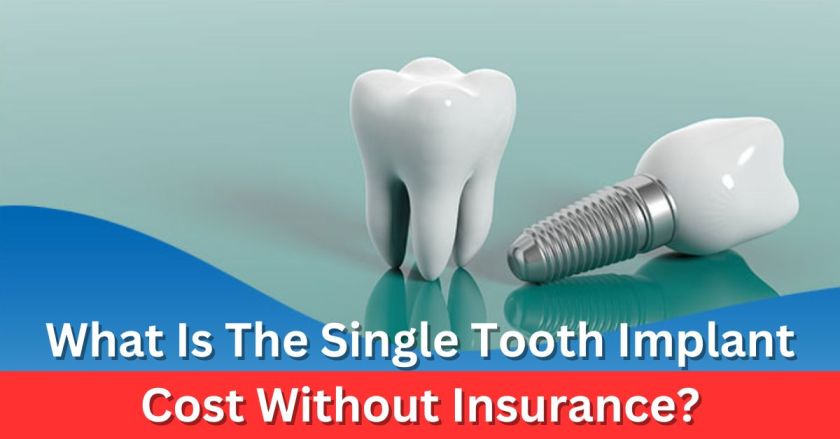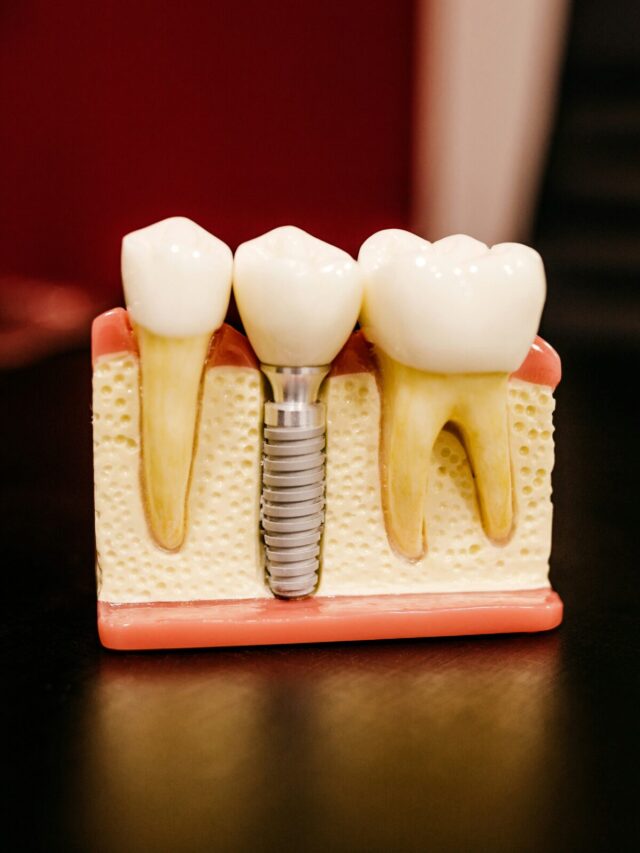1) Introduction
In this article, we are going to discuss about Single Tooth Implant Cost Without Insurance. We have researched a lot and gathered some critical points for you, and this will help you a lot, and you will get all the knowledge for which you came.
A. Explanation of Single Tooth Implants
Dental implants stand as the architectural marvels of modern dentistry, heralding a transformative era in tooth restoration. A single tooth implant involves inserting a titanium post into the jawbone, which acts as a root for a prosthetic tooth. This method offers a durable, long-lasting solution that closely mimics the function and appearance of natural teeth.
B. Importance of Dental Health
Maintaining good oral health is essential for your overall wellness. A missing tooth doesn’t just affect your smile; it can lead to further dental issues such as misalignment, bone loss, and difficulties in speaking or chewing. Therefore, addressing tooth loss promptly is important.
C. Overview of Why People Seek Dental Implants
nts for various reasons, including restoring chewing ability, improving speech, boosting self-esteem, and maintaining facial structure. Given their high success rate and longevity, dental implants are often considered the gold standard in tooth replacement options.
2) Factors Influencing the Cost of Single Tooth Implants
A. Materials Used
The type of materials used in the implant can significantly affect the cost. Titanium, which is commonly used for the implant post, varies in price based on its grade and the manufacturer. High-quality materials ensure better durability and lower risk of complications.
B. Location of the Dental Clinic
Geographical location plays a role in the cost of dental implants. Clinics in urban areas or regions with a higher cost of living usually charge more than those in rural areas.
C. Expertise of the Dental Professional
The experience and reputation of the dental professional performing the procedure can also impact the overall cost. Highly skilled and specialized dentists may charge premium rates but often offer better outcomes.
D. Additional Procedures Required
Sometimes, additional procedures like bone grafting or sinus lifts are necessary to prepare the jawbone for the implant. These procedures add to the overall cost and complexity of the treatment.
E. Brand and Type of Implant
Different brands and types of implants come with varying price tags. Some brands offer advanced features or proprietary technologies that can drive up the cost.
3) Average Single Tooth Implant Cost Without Insurance
A. National Average Cost Breakdown
The national average cost of one implant (single tooth implant) in the USA ranges between $3,000 to $5,000. This estimate includes the implant post, abutment, and the crown.
B. Regional Cost Variations
Costs can vary widely based on regional factors. For example, dental implants in metropolitan areas like New York or Los Angeles may be more expensive compared to smaller towns or cities.
C. Case-Specific Cost Factors
Factors like the need for bone grafting or sinus lift can add $200 to $3,000 to the total cost. Additionally, consultation fees often range from $100 to $300 but may be included in the overall treatment cost.
D. Consultation Fees
Initial consultation fees vary depending on the clinic and can range from $100 to $300. Some clinics roll this fee into the total cost if you proceed with the treatment.
4) Comparison with Other Tooth Replacement Options
A. Cost Comparison with Dental Bridges, Partial Dentures, and Full Dentures
- Dental Bridges: Typically range from $2,000 to $5,000.
- Partial Dentures: Generally cost between $300 to $2,500.
- Complete Dentures: Range from $600 to $8,000 depending on quality and customization.
B. Long-Term Benefits of Implants vs. Other Options
While dental bridges and dentures may be cheaper initially, implants offer long-term benefits such as durability, reduced maintenance, and improved functionality.
C. Factors Affecting Overall Value
Dental implants, despite their higher upfront cost, often prove to be more cost-effective in the long run due to their durability and lower maintenance requirements.
5) Financing Options for Dental Implants
A. Payment Plans Offered by Dental Clinics
Many dental clinics offer in-house payment plans that allow you to spread the cost over several months or years, making it easier to manage financially.
B. Third-Party Financing Options
Services like CareCredit and LendingClub offer specialized dental financing plans. These can include interest-free periods or low-interest rates, making implants more affordable.
C. Health Savings Accounts (HSAs) and Flexible Spending Accounts (FSAs)
HSAs and FSAs allow you to use pre-tax dollars for medical expenses, including dental implants. This has the potential to result in substantial savings.
D. Dental Insurance Coverage Considerations
While many dental insurance plans do not cover implants, it’s worth checking with your provider to see if they offer any form of partial coverage or discounts.
6) Tips for Reducing Implant Costs
A. Researching Multiple Dental Clinics for Price Comparisons
Obtaining quotes from multiple clinics can help you find the best deal. Don’t hesitate to ask for itemized costs so you can make a direct comparison.
B. Inquiring About Discounts or Promotions
Some dental clinics offer seasonal promotions or discounts for new patients. Always ask if there are any ongoing offers.
C. Exploring Dental Tourism Options
Dental tourism involves traveling to another country where dental procedures are cheaper. Countries like Mexico, Costa Rica, and India are popular choices for affordable, high-quality dental care.
D. Seeking Out Dental Schools for Discounted Treatment
Dental schools often offer lower-cost treatments performed by students under the supervision of experienced professionals. This offers a budget-friendly alternative without sacrificing quality.
7) Potential Long-Term Savings and Benefits of Dental Implants
A. Reduced Need for Future Dental Work
Implants are known for their durability. Unlike other options, they do not require frequent replacements or adjustments, saving you money in the long term.
B. Improved Oral Health and Overall Well-Being
Dental implants help maintain jawbone density and prevent the shifting of adjacent teeth, contributing to better oral health and overall well-being.
C. Enhanced Confidence and Quality of Life
The natural look and feel of implants can significantly boost your confidence and improve your quality of life, making social interactions more enjoyable.
8) Risks and Considerations
A. Potential Complications and Associated Costs
Complications such as infections or implant failure, though rare, can occur and may require additional treatment costs.
B. Importance of Choosing a Qualified and Experienced Dental Professional
Selecting a reputable and experienced dental professional minimizes risks and ensures a higher success rate. Always check credentials and seek reviews from previous patients.
C. Post-Operative Care and Maintenance Costs
Effective post-operative care is imperative for ensuring the success of dental implants. Regular check-ups and proper oral hygiene are essential and may incur additional costs.
9) Conclusion
A. Summary of Key Points
Understanding the cost of single tooth implants involves considering various factors, including materials, location, and additional procedures.
B. Encouragement for Seeking Professional Advice
Consulting with a qualified dental professional can provide personalized insights and help you make an informed decision.
C. Importance of Dental Health Investment
Investing in dental implants is a worthwhile endeavor for long-term oral health and overall quality of life.
D. Reiteration of the Value of Dental Implants for Long-Term Oral Health and Quality of Life
Despite the initial cost, dental implants offer unparalleled benefits, making them a valuable investment in your health and well-being.
By thoroughly understanding these aspects, you can make an informed decision about dental implants and take steps to manage the cost effectively. For more personalized advice and to explore your options, don’t hesitate to reach out to a dental professional.
FAQs
A well-maintained dental implant can last between 15 to 25 years or even longer.
Most patients experience minimal discomfort during the procedure, which can be managed with local anesthesia and over-the-counter pain medications.
The process can take anywhere from 3 to 9 months, depending on the patient’s healing and whether additional procedures are needed.
Candidates for dental implants should have good oral health, sufficient bone density, and be non-smokers or willing to quit during the healing process.
While rare, risks can include infection, implant failure, nerve damage, or sinus problems. It’s crucial to follow your dentist’s instructions for pre- and post-operative care.
Some dental and medical insurance plans are starting to cover portions of the implant procedure. It’s worth checking with your provider for detailed information.
Alternatives include dental bridges and removable dentures, though they may not offer the same level of comfort or longevity.
Around 600$ To 800$.









